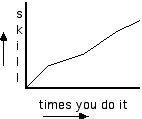Read the following text and if there is an open space write down the number with the word to be filled in. If there are 3 alternatives given, write down the number with the correct one. In an open space only one word may be filled in. If more words are written down only the first one is considered.
Write out the words and essay on separate papers. You may keep these texts.
From New Scientist, Innovation in perspective.
I. Why industry must learn to forget
by Sir Ieuan Maddock
When an industry or, indeed, any aspect of social behaviour fall short of some desired objective, the initial tendency is to intensify the process of learning. More education, more training, and more modern techniques are invariably invoked as a cure for the malaise. Yet are these the panaceas they appear to be? What purpose has education if it produces individuals who are ill-matched to the needs of their society? And what gain is there if training and new techniques are not applied because of a reluctance or an inablity to change? From this last question comes the concept that all development -whether of the individual, a company or a whole nation - requires an interplay between "learning" and "forgetting".

I would like to make this point still more strongly. The ability to forget - to shed past habits, attitudes, techniques and capital resources is often at least as important as the ability to learn.
Most engineers and technologists are familiar with "learning curves" - the graphical analogy of the process by which skills progressively build up and more efficient methods are introduced.

Probably without realising it, every amateur cook, or do-it-yourself houseowner has experience of the same process - the climb up the learning curve.
The more advanced and complex the technology, the longer and more painful is the climb and if the technology is advancing rapidly, then a new curve comes in sight as soon as the tip of one has been reached, so that the climb has to continue.
The reality of the learning (1)...... has long been acknowledged in the (2)...... and the execution of very complex (3)...... Many people have tried to quantify (4).... We know for example, that as the (5)...... run of a particular motor car or radio set progresses, the efficiency of (6) .. improves and the cost continue to (7)...... But if models are changed frequently (8)..... if there are sudden switches in production (9)...... , it becomes necessary to climb new (10).... curves and so the efficiency drops.
But what I want to talk about is the forgetting curves - how are old or outdated skills shed, old attitudes discarded, old plant scrapped and old traditions rejected? Few people have studied this phenomenon yet it contributes more to success in engineering-based industries than do learning curves.
Experience shows that forgetting curves (11) ...... much gentler than learning curves, yet success (12) ..... a rapidly changing industry is largely (13)...... by the interplay between the two. (14)Failures/habit/misfits can be caused not so much because the forgetting curves (15) ...... not steep enough but because the forgetting curves are too (16).....
The learning curve, the ability (17) ..... absorb a new technology, is shaped (18)..... many factors - its complexity, the level of (19)ease/ideas/skills and insight it calls for, its (20)...... of progress and the amount of (21) capital/equipment/goods that may be needed. An important (22) ....... is the level of literacy, numeracy and of (23) ...... understanding of the work force. People with a poor level of education will inevitably find it difficult to absorb a new (24)....
However, once people are educated above a (25)...... level their ability to absorb (26) ...... rapidly. When someone has made a (27) ... breakthrough, a newcomer to the technology (28) .... reach a high level of competence (29) ...... than the innovator. Thus the ability (30)...... make textiles, radio sets, sewing (31) ......, optical goods, small internal combustion engines, electric lamps and so (32), has spread rapidly all over the (33)...... The former dominance of some of (34) ...... European nations in such technologies has (35)..... surrendered not only to Japan which (36) ..... long had a level of (37) ....... and literacy, but also to Hong Kong, Taiwan, Singapore and Korea. Now contenders (38) ...... as the Philipines, Vietnam, Indonesia and several (39)..... the South American states are (40)beginning/commencing/emerging as industrial manufacturers. The new competitors' (41)...... are not inferior imitations, but are (42) ...... least as good as the originals - and (43)......... better. People are transferring technology ever (44)...... rapidly around the world and anybody (45)...... believes that one company or country (46) ...... some natural and permanent supremacy is (47)........ from an illusion.
But education is only (48) ..... of the process. Another element is for (49) ...... to be prepared to abandon favoured or safe concepts - familiar (50) ...... practices or cheap materials. They must face up to "change".
Back to index testing:
